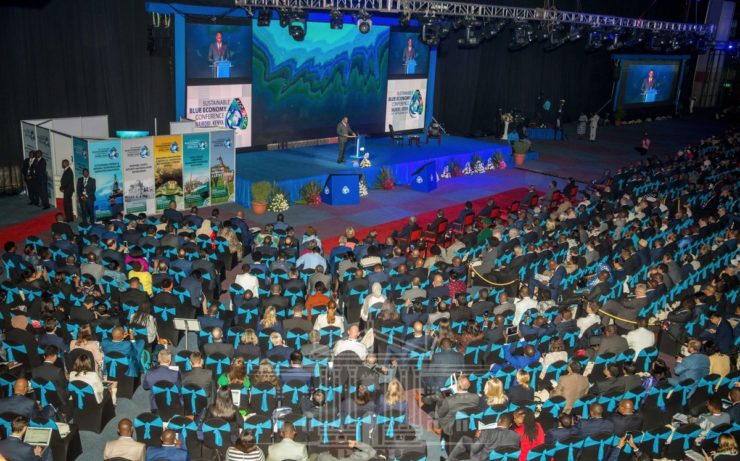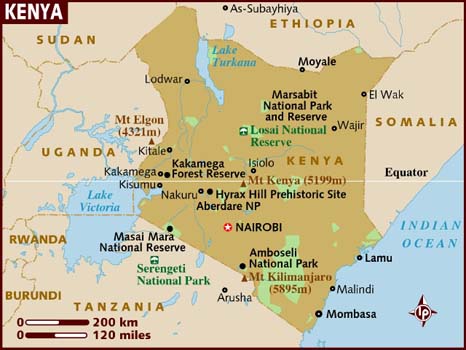Africa hosting Sustainable Blue Economy conference
November 28, 2018 | Expert Insights

Africa is hosting a historic conference that has to do with environmental protection. The first ever Sustainable Blue Conference is being held Kenyan capital, Nairobi.
Background
According to the World Bank, the blue economy is the "sustainable use of ocean resources for economic growth, improved livelihoods, and jobs while preserving the health of ocean ecosystem."
On top of the traditional ocean activities such as fisheries, tourism and maritime transport, blue economy entails emerging industries including renewable energy, aquaculture, seabed extractive activities and marine biotechnology and bioprospecting. The blue economy also attempts to embrace ocean ecosystem services that are not captured by the market but provide a significant contribution to economic and human activity. They include carbon sequestration, coastal protection, waste disposal, and the existence of biodiversity.
The 2015 WWF briefing puts the value of key ocean assets over US$24 trillion. Fisheries are now overexploited, but there is still plenty of room for aquaculture and offshore wind power. Aquaculture is the fastest growing food sector with a supply of 58 per cent of fish to global markets. Aquaculture is vital to the food security of the poorest countries especially. Only in the European Union, the blue economy employed 3,362,510 people in 2014.

Analysis
Kenya is hosting Africa's first ever conference on sustainable blue economies with the aim of increasing the sustainability of countries who depend on oceans or ocean-based resources. The conference is in accordance with the more comprehensive Sustainable Development Goals and will last from 26th to 28th November 2018.
The three-day conference has high global support with over twenty world leaders in Nairobi for the event. A number of environment-friendly civil society organizations are also in attendance.
After years of advocacy in the area, this is the first conference on Sustainable Blue Economy. It is taking place across three continents. Kenya is hosting it with Canada and Japan as co-hosts. There are 17,000 plus participants from some 184 countries involved in the conference. It pools under one roof political leaders and government representatives from across the world, the African Union, United Nations organs and Commonwealth are also participating.
Other interested parties are The World Wildlife Fund, WWF; International Maritime Organization, IMO; International Seabed Authority, ISA; the World Bank; AFRIEXIMBANK; Ocean Foundation etc.
The Blue Economy is the economic benefit and value we realize from the Earth’s coastal and marine environment.
Sustainable Blue Economy is a marine-based economy that provides social and economic benefits for current and future generations, restores, protects and maintains the diversity, productivity and resilience of marine ecosystems, and is based on clean technologies, renewable energy, and circular material flows
The website dedicated to the conference said: “The world has rallied around the enormous pressures facing our oceans and waters, from plastic pollution to the impacts of climate change.
“At the same time, there is international recognition that we need to develop our waters in an inclusive and sustainable manner for the benefit of all.
“The Sustainable Blue Economy Conference builds on the momentum of the UN’s 2030 Agenda for Sustainable Development, the 2015 Climate Change Conference in Paris and the UN Ocean Conference 2017 ‘Call to Action. ‘”
The multi-pronged conference will primarily:
1. Identify how to harness the potential of the blue economy to create jobs and combat poverty and hunger.
2. Show how economic development and healthy waters go hand in hand.
3. Capture commitments and practical actions that can be taken today.
4. Bring together the players needed to transition to a blue economy
“Overfishing and its ecosystem impacts is increasingly becoming an equity and humanitarian issue; global leaders must urgently act together – with a strong sense of urgency” said a regional director from the WWF.
Assessment
Our assessment is that a major African economy like Kenya hosting a conference on sustainable blue economies is a sign of measurable progress in the sustainable harvest of ocean-based resources. We believe that Africa’s largely predominantly resource-based economies can benefit substantially if sustainable economic practices are implemented before large-scale industrial pollution materialises.








Comments